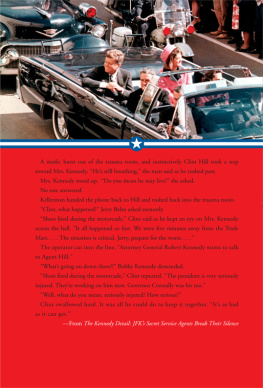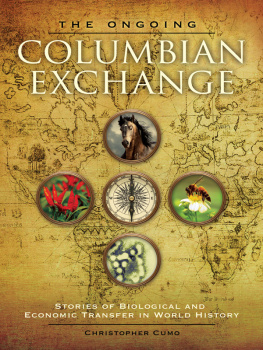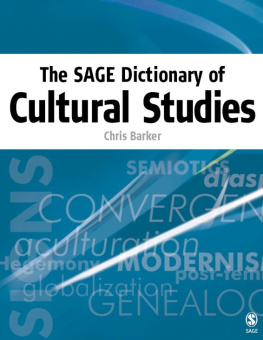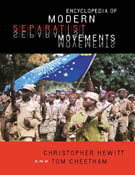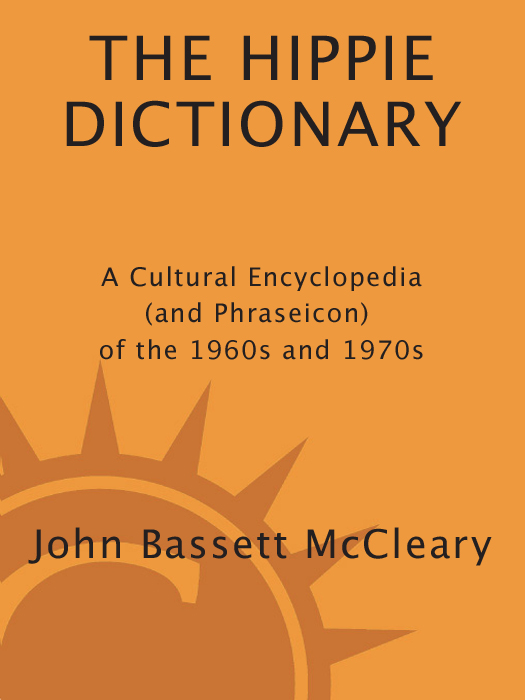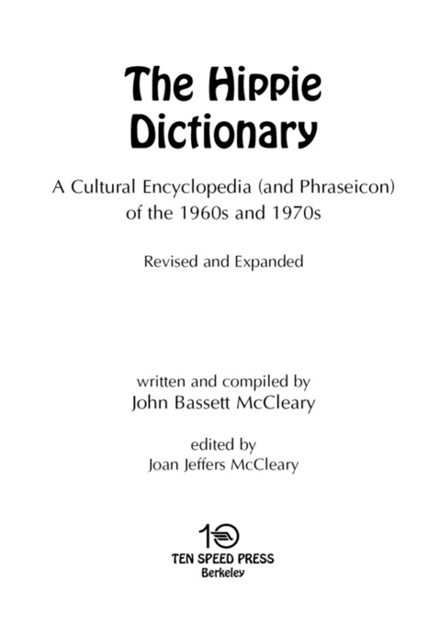Copyright 2002, 2004 John Bassett McCleary
All rights reserved. Published in the United States by Ten Speed Press, an imprint of the Crown Publishing Group, a division of Random House, Inc., New York.
www.crownpublishing.com
www.tenspeed.com
Ten Speed Press and the Ten Speed Press colophon are registered trademarks of Random House, Inc.
Library of Congress Cataloging-in-Publication Data
McCleary, John Bassett, 1943
The hippie dictionary : a cultural encyclopedia (and phraseicon) of the 1960s and 1970s / written and compiled by John Bassett McCleary ; edited by Joan Jeffers McCleary. Rev. and expanded ed.
p. cm.
1. HippiesUnited StatesDictionaries. I. McCleary, Joan Jeffers. II. Title.
HQ799.7.M28 2004
305.568dc22
2004000725
eISBN: 978-0-307-81433-3
Production by Chloe Rawlins
First edition cover design by Paul Kepple @ Headcase Design
Revised edition cover design by Chloe Rawlins based on original design by Paul Kepple
Cover photograph by Chip Simons / Getty Images
v3.1
In memory of my mother, Pauline Meeks McCleary, and my mother-in-law, Frances Wheeler Jeffers, two bohemian spirits.
I learned how to spell respect from Aretha Franklin and encyclopedia from Mickey Mouse.
John Bassett McCleary
Contents
Civil Rights
Events, Demonstrations, and Legislation
Anti-War
Events and Demonstrations
Black Power and Revolutionary
Groups Engaging in Violence or Civil Disobedience
Free-Speech, Student Rights, and Human Rights
Events and Demonstrations
Womens Movement (Feminist and Womens Liberation)
Events, Demonstrations, and Legislation
Gay and Lesbian Movement
Events, Demonstrations, and Legislation
Native American and Other Minority Rights
Events, Demonstrations, and Legislation
Ecology and Environmental
Events, Demonstrations, and Legislation
Computer Revolution
Milestones and Events
Apologies
I may have overlooked some events, people, or terms of the era, and for this, I apologize. Some facts may be missing or questionable due to a lack of resources, and for that, I apologize. I do not consider this book to be the last word on every subject of the hippie era, yet I do believe it is the best overview of the entire era yet compiled. There are many other books focusing more closely on individual aspects of the period. I think I have covered self-gratification pretty well, but if one wants to study the subtleties of joint rolling or grok the inner workings of a Volkswagen carburetor, there are other sources to peruse. Many of these sources are noted in in Lists at the back of this book.
Even though this is a reference book intended as a scholarly observation of a period of history, I am not ignoring the free spirit of the era. If I were merely objective and technically pedantic in the creation of this book, I would be missing the true value of the hippie era to our society and ignoring the lessons that period of time contributed to history. In the spirit of adventure and experimentation evoked by the 1960s and 70s, I am breaking some rules, taking liberties with the English language and even creating new words to communicate new ideas and concepts.
From this point on in my writing, they and their will be used to represent singular as well as a plural. Example: Each person has their own fork, and someone who is trying to be what they are not. These words have been used this way in verbal conversation for a long, long time, by almost everyone (except my wife). This change to the English language will help to alleviate the problem of his or her and the constant debate about creating new words, such as hesh or hirsh to produce a gender-neutral, singular designation. Hesh or hirsh sounds funny, his and/or hers is awkward, and, to be politically correct, which should come first, she or he? I want to get over this debate and on with writing.
In this book I concentrated primarily on the counterculture of America, yet I know that there were and are hippies and people of that spirit in all countries of the world. I also relied heavily on California definitions, institutions, and activities; that is because I believe, if the hippie culture had a center, it was most likely the West Coast of America. This is not to say that I have ignored other states of the union or other countries. Whenever I was aware of a variation in definition, I included it.
No Apologies
Some critics might say that, since this is a reference book, opinions of the writer should not be voiced; yet I am editorializing at times in this dictionary because the era was a very opinionated period of time, and certain attitudes that I express represent, I believe, typical hippie philosophy.
In the spirit of better communication and understanding, I have created a new form of dictionary and coined a new word to describe it. On the title page, in the subtitle of this book, one will find the new word Phraseicon; this is a new concept in dictionaries. As one will soon discover within this book, a large portion of the entries are phrases composed of several words. This is a unique development in dictionaries; I have included a higher percentage of phrase entries in this publication than appear in previous reference books.
In a standard dictionary, approximately 1 in 25 entries is a multiword offering; in slang dictionaries prior to this book, the ratio has been about 5 in 25 entries; while in this dictionary, the percentage is almost 50 percent phrases. I have done this because the language of today consists of more than merely several syllable grunts as it was back in the 1950s. Abstract communication requires multiple words. Feelings and philosophies demand phrases, contractions, prefixes, and suffixes. Very few new words are actually created each day or even within each era, but many new concepts based on existing words are being developed. Combining existing words to create new meanings is a process I have addressed in this book. I have also created several new words in the writing of this book as new concepts arose. These new words are marked with *** (three asterisks).
This dictionary was a monumental undertaking; it has consumed much of my interest for over eight years. When I started, the Internet was not readily available to me, and I got most of my information, facts, and figures the old wayby reading, listening, and searching libraries. As I approach the completion of this book, the Internet is available, yet still convoluted and confusing. Although I have employed computer references at times, I find that old hard copy is still the best way to get most of the information I need. Another advantage to going to the library is that it gives one a social life. Sitting at a computer all day and night is no proper life for a human being. There are people at the library and opportunities for social exchange. Trips to the library have also enabled me to maintain a healthy skin color through continuous, regular exposure to the copy machine lamps.
Acknowledgments
I want to thank my wife, Joan Jeffers McCleary, who is also my editor. Not many editors will reheat your coffee and kiss the nape of your neck as you hunch over your computer monitor.
I would like to offer my benediction to Phil Wood, my publisher, whose faith in the project made it possible. I extend gratitude to Tom Southern, and give robust thanks to Meghan Keeffe and Mary Behm-Steinberg for their editing assistance.



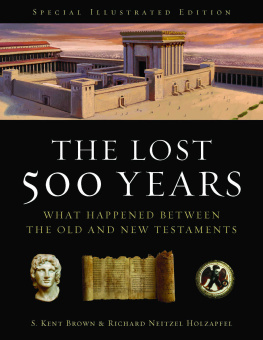
![Patrick G. Zander - Fascism through History [2 volumes]: Culture, Ideology, and Daily Life](/uploads/posts/book/262756/thumbs/patrick-g-zander-fascism-through-history-2.jpg)
